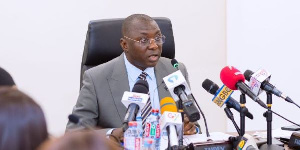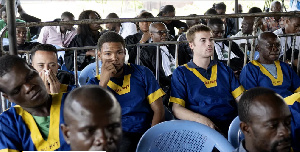- Home - News
- Polls
- Year In Review
- News Archive
- Crime & Punishment
- Politics
- Regional
- Editorial
- Health
- Ghanaians Abroad
- Tabloid
- Africa
- Religion
- Election 2020
- Coronavirus
- Photo Archives
- News Headlines
- Press Release
General News of Saturday, 16 April 2022
Source: ghanaiantimes.com.gh
COCOBOD CEO inspects cocoa farms, roads in Western North
The Chief Executive Officer (CEO) of COCOBOD, Mr Joseph Boahen Aidoo, Tuesday, inspected the rehabilitation of cocoa farms at Kumikrom in the Sefwi Bekwai corridors of the Western North Region.
The visit formed part of his two-day tour of the area to meet chiefs and people in the cocoa-growing areas, interact with farmers and the media and also assess the progress of work on the ongoing construction of cocoa roads including the Benchemaa -Adjoafua road, Debiso/Adabokrom road and that of Yamatwa junction/Yamatwa road.
Accompanied by a management team, including Deputy Chief Executive, Agronomy and Quality, Dr Emmanuel Agyemang Dwomo, and Regional Manager, Cocoa Health and Extension (CHED), Western North, Mr Kwame Owusu Ansah, Mr Aidoo also inspected the rehabilitation of farms at Nsaworakrom, Kofi Kesse and Yaw Kariba and engaged farmers at Pillar 34, ending with a durbar with chiefs and people of Elluokrom.
Mr Aidoo was expected to pay a courtesy call on the Omanhene of Sefwi Wiawso, Katakyie Kwasi Bumaga II, inspect the plantain plantation nursery site and interact with chiefs and people of Dadieso, inspect rehabilitated farms at Tawiahkrom and Hello-Fine enclaves, ongoing Dadieso -Enchi road construction, Enchi -Elubo road and also hold a durbar with chiefs and farmers of Jema.
Briefing Mr Aidoo on the 145-hectare cocoa rehabilitation farm, the Sefwi Bekwai District Cocoa Officer, Mr Frank Amamo Antwi, mentioned that 74 farmers had benefitted from free cutting of the Cocoa Swollen Shoot Virus Disease (CSSVD), land preparation, free provision of plantain suckers, hybrid cocoa seedlings and economic trees.
The package, he added, included payment of compensation to farmers and landowners, maintenance of farms up to two years, and free extension education.
So far, Mr Antwi said that 152,000 plantain suckers had been planted on the Kumikrom rehabilitated cocoa farm, adding that, a work gang of 91 had been dedicated and working hard to weed the farm.
Recognizing progress at the Kumikrom rehabilitation project, Mr Boahen reiterated that cocoa business had not collapsed as some had claimed, but, rather, the business was bouncing back with hope to stability.
He noted that in 2017 when the government assumed office, research indicated that CSSVD had attacked most farms long ago and undermined the longevity of the industry and efforts of cocoa farmers.
“The solution was to cut affected cocoa trees. Unfortunately, farmers did not understand and kept weeding farms attacked by the cocoa disease. Clearly, if the virus from one affected tree attacked the root of another tree, so we began a tour to farms to educate farmers,” Mr. Aidoo said.
He warned that if efforts at eradicating cocoa swollen shoot disease was not sustained,” within five to 10 years, we’ll end up destroying our cocoa farms.”
George Gyapong, a cocoa farmer, applauded Mr Aidoo and the COCOBOD team for their hard work and commitment to implementing the National Cocoa Rehabilitation Programme (NCRP) to eradicate cocoa swollen shoot disease and also boost production.











